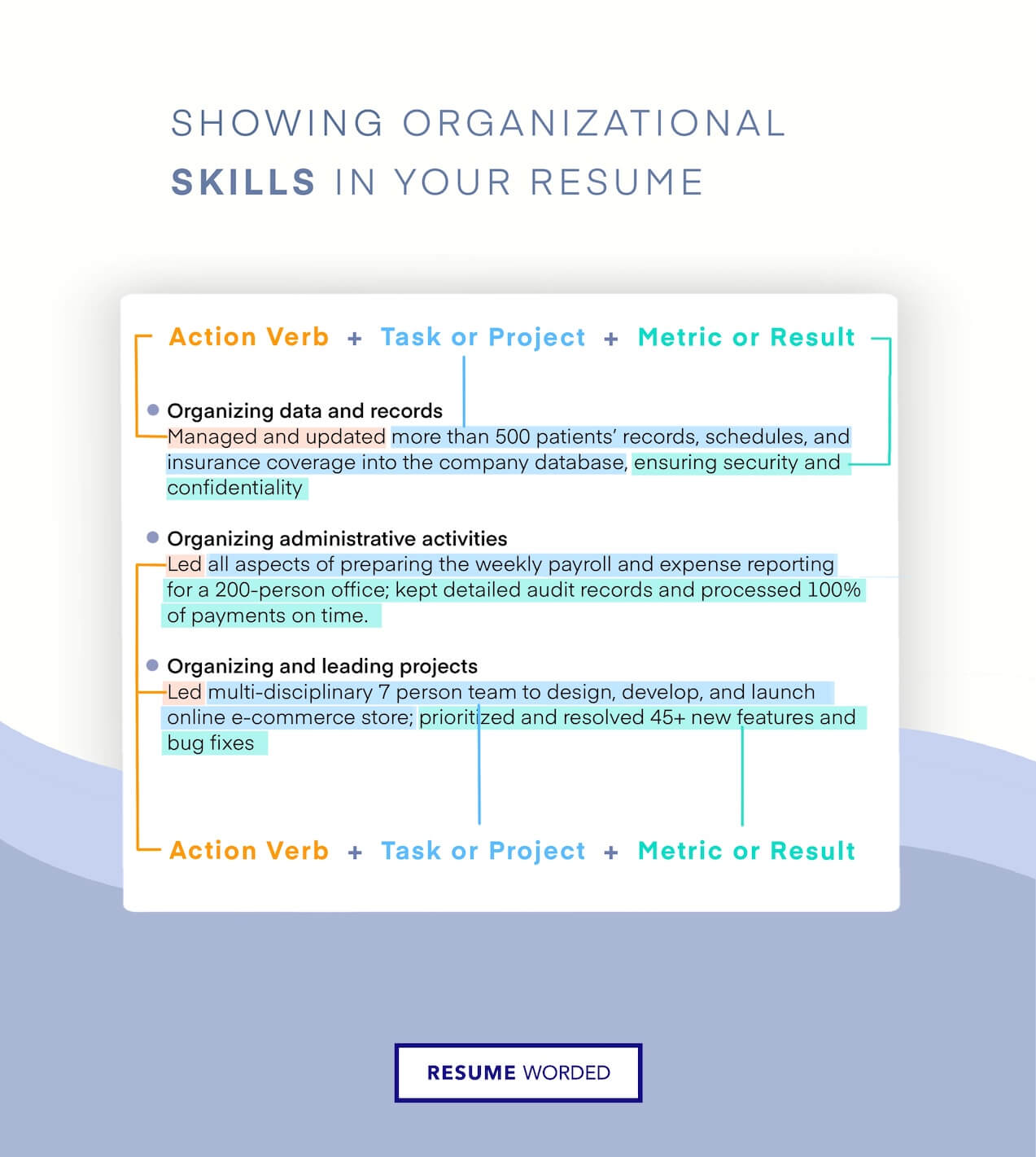Resume Synonyms for Organize
Want another word for Organize to use on your resume? Our team's compiled the most effective action verbs and synonyms you can use instead of the overused resume phrase, "Organize".
Want another word for Organize to use on your resume? Our team's compiled the most effective action verbs and synonyms you can use instead of the overused resume phrase, "Organize".
Action verbs reveal skill sets and expertise, allowing employers to evaluate candidates. A candidate who organizes well will likely do an excellent job in project management. Employers look for candidates who have demonstrated this skill by including the word 'organize' in their resumes.
The skillset associated with the verb 'organize' is incredibly broad yet generic and can be used to describe any job. For example, you can organize anything from a school fundraiser to a business proposal. To write an effective resume, use power verbs instead of generic ones; also, you should describe your previous experiences in the past tense ('organized').
Power verbs create a mental image for the reader, making them more engaged in your accomplishments. They also show that you've been able to do something specific. So instead of saying that you 'organize,' say that you 'strategized,' 'structured,' or 'systematized,' or whatever it is that happened when you 'organize' something.
By using strong action verbs, you not only show your ability to organize people, projects, and other resources but also demonstrate that you can take something from inception to completion. It shows that you have the ability to lead others through a process and direct them toward results.
I've compiled some synonyms you can use instead of Organize on your resume, followed by real examples I've written for clients (feel free to use them!).
Let's look at examples of how you can remove and replace the overused phrase, Organize, with a stronger synonym and alternative that is more effective at highlighting your achievements.
• sales database of prospects
After: Using a stronger synonym• a sales database of 6K potential clients, increasing the number of new client leads by 69%, an improvement over previous years. .
• company files on the mainframe
After: Arranged• 10,000+ company files on the mainframe by date and priority, leading to a 35% decrease in document search time for employees.
By specifying the quantity of work done and the improvement that resulted, this rephrased bullet point provides a clearer picture of your impact on the company. Avoiding 'organize' in favour of 'arranged' sounds more professional and less common.
Tip: I've prepared a ton of additional examples for you to give you inspiration. Please click on any of the following to expand and see real examples of how I've rewritten client bullet points.
We've put together an infographic to give you more examples of how to put this into practice. Note the use of strong action verbs instead of words like Organize.

• sector research in TMT space through expert interviews, market reports, and engagement with external advisors; created sector map of big data analytics space; prepared recommendations on attractiveness and feasibility on 6+ prospects.
• complete investment pitch books for 4 deals at advanced stages and liaised with 12 prospective international co-investors.
• $800K of monthly marketing spend data to optimize audience, creative and copy of campaigns; increased conversion by 12% MoM and decreased cost per acquisition by 35%.
• a 10-week engagement in a four-member team for a solar energy provider; assessed 30+ locations and provided a recommendation for the most suitable location of their new headquarters.
• method to compute similarity of all methods in a code base; reduced time complexity from O(n2) to O(n log n).
• and maintained ETL scripts in Python and Perl to scrape data from external web sites into a mySQL database..
If you're looking for another word to use in place of Organize, consider using one of these stronger alternatives:
If you're looking for another word to use in place of Organize, consider using one of these stronger alternatives:
I'd recommend uploading your resume below to get a free resume review. You'll get a detailed analysis of your resume's action verbs and your experience, with instant suggestions on how to improve them based on recruiter insights.
Get expert feedback on your resume, instantly. Our free AI-powered resume checker scores your resume on key criteria recruiters and hiring managers look for. Get actionable steps to revamp your resume and land more interviews.
Upload Resume
"My free resume review was truly eye-opening. I found out why I wasn't getting interviews and exactly what to add to get past resume screeners. I've already had way more callbacks since I used it. I recommend it to all my friends who are job searching."

"Probably the best thing I've done this year. Showed me what my strengths were and the jobs and industries I should be focusing on. The most impactful part though was how it identified this spiral I'd been doing subconsciously - yikes, freakishly accurate."

Thank you for the checklist! I realized I was making so many mistakes on my resume that I've now fixed. I'm much more confident in my resume now.